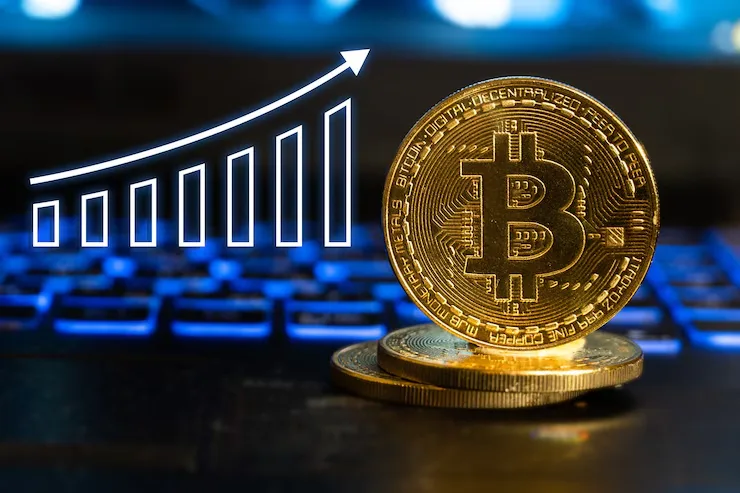In recent years, cryptocurrency has become a buzzword in finance, technology, and even everyday conversations. But what exactly is it? 🤔
If you’ve heard of Bitcoin, Ethereum, or Dogecoin but aren’t sure how they work, this guide will break it down in simple, easy-to-understand terms. Let’s dive into the world of digital money! 🚀
📌 What is Cryptocurrency?
Cryptocurrency is a type of digital or virtual currency that uses cryptography (advanced encryption techniques) to secure transactions. Unlike traditional money (like dollars or euros), cryptocurrencies are decentralized, meaning no bank or government controls them. Instead, they run on a technology called blockchain.
🔹 Key Features of Cryptocurrency:
✔ Digital Only – No physical coins or bills; it exists only online.
✔ Decentralized – No central authority (like a bank) controls it.
✔ Secure – Uses cryptography to prevent fraud and hacking.
✔ Global – Can be sent anywhere in the world without borders.
✔ Transparent – All transactions are recorded on a public ledger (blockchain).
🔗 How Does Cryptocurrency Work?
1. Blockchain Technology 🧱⛓️
Most cryptocurrencies run on blockchain, a digital ledger that records all transactions across a network of computers. Each “block” contains transaction data, and once verified, it’s added to the “chain.” This makes it nearly impossible to alter or hack.
2. Mining & Validation �️🖥️
Some cryptocurrencies (like Bitcoin) use mining, where powerful computers solve complex math problems to validate transactions. Miners are rewarded with new coins as an incentive.
3. Wallets & Keys 🔐💼
To use crypto, you need a digital wallet (software or hardware-based). Each wallet has:
- A public key (like a bank account number, used to receive funds).
- A private key (like a password, used to access and send funds – never share this!).
💡 Popular Types of Cryptocurrencies
There are thousands of cryptocurrencies, but here are some of the most well-known:
1. Bitcoin (BTC) ₿
- The first and most valuable cryptocurrency, created in 2009 by Satoshi Nakamoto (a mysterious person/group).
- It is often referred to as “digital gold” due to its limited supply, as only 21 million will ever exist.
2. Ethereum (ETH) Ξ
- More than just a currency, it supports smart contracts (self-executing agreements) and decentralized apps (DApps).
- Used for NFTs, DeFi (Decentralized Finance), and more.
3. Other Notable Cryptos
- Ripple (XRP) – Focuses on fast, low-cost international payments.
- Litecoin (LTC) – A faster, lighter version of Bitcoin.
- Dogecoin (DOGE) – Started as a meme but gained popularity (thanks to Elon Musk!).
✅✅ Pros & Cons of Cryptocurrency
Cryptocurrency has revolutionized finance, but like any technology, it has strengths and weaknesses. Let’s explore them in detail:
👍 Advantages of Cryptocurrency
✔ Fast & Cheap Transactions
Traditional bank transfers (especially international ones) can take days and involve high fees. Cryptocurrency transactions, however, are processed within minutes or even seconds, often at a fraction of the cost. For example:
- Bitcoin transactions may take ~10 minutes to an hour.
- Ethereum and other altcoins can confirm transactions in seconds.
- Ripple (XRP) is designed for instant cross-border payments at near-zero cost.
✔ No Middlemen (Decentralization)
Unlike traditional banking, where banks, governments, or payment processors control transactions, cryptocurrencies operate on decentralized networks. This means:
- No bank delays or freezes – You control your money 24/7.
- No account closures – Banks can shut down accounts, but crypto wallets can’t be “deactivated.”
- Censorship-resistant – Governments can’t easily block transactions.
✔ Inflation Protection (Limited Supply)
Many cryptocurrencies, like Bitcoin (max supply: 21 million), have a fixed supply, making them deflationary (their value may increase over time). In contrast, fiat currencies (USD, EUR, etc.) lose value due to inflation as governments print more money.
✔ Investment & Earning Opportunities
Crypto isn’t just for payments—it’s also a high-growth asset class:
- Long-term holding (HODLing) – Many investors buy and hold, expecting prices to rise.
- Staking & Yield Farming – Some cryptos (like Ethereum 2.0) allow users to earn interest by locking up coins.
- Trading & NFTs – Crypto markets operate 24/7, and NFTs have created new digital ownership opportunities.
👎 Disadvantages of Cryptocurrency
❌ Extreme Volatility (Price Swings)
Crypto prices can surge 100% in a week… or crash 50% in a day. For example:
- Bitcoin hit 69,000in2021∗∗,thendroppedto∗∗69,000in2021∗∗,thendroppedto∗∗16,000 in 2022.
- Meme coins like Dogecoin can pump and dump based on social media hype.
This makes crypto risky for short-term traders and unstable as a daily currency.
❌ Security Risks (Hacks & Lost Keys)
Since crypto is digital and irreversible, security is crucial:
- Lost Private Key? → Funds are gone forever (no “Forgot Password” option).
- Exchange Hacks – Platforms like Mt. Gox (460Mstolen)∗∗and∗∗FTX(460Mstolen)∗∗and∗∗FTX(8B missing) show the risks of keeping crypto on exchanges.
- Scams & Phishing – Fake wallets, Ponzi schemes, and rug pulls trick users into losing money.
❌ Regulation & Legal Uncertainty
Governments are still figuring out how to regulate crypto, leading to:
- Bans – China, Nigeria, and others have restricted or banned crypto trading.
- Tax Complications – Some countries tax crypto profits heavily.
- Unclear Rules – Laws change frequently, creating uncertainty for businesses and investors.
❌ Used for Illegal Activities
Because crypto is pseudonymous, criminals sometimes exploit it for:
- Darknet Markets – Buying/selling illegal goods.
- Ransomware Attacks – Hackers demand Bitcoin payments.
- Money Laundering – Mixing services hide transaction trails.
(However, cash is still the #1 choice for illegal finance—crypto transactions are traceable on the blockchain.)
🚀 The Future of Cryptocurrency
Crypto is still evolving, and its future is uncertain but exciting! Here’s what’s coming:
🔸 More Adoption – Big companies like Tesla, PayPal, and Visa now accept crypto.
🔸 CBDCs (Central Bank Digital Currencies) – Governments are exploring their own digital currencies.
🔸 Web3 & DeFi – Decentralized finance could replace traditional banking.
🔸 NFTs & Metaverse – Cryptocurrency will power virtual economies.
🎯 Final Thoughts: Should You Invest in Crypto?
Cryptocurrency is risky but revolutionary. Before investing:
- Do your research (DYOR – “Do Your Own Research”).
- Only invest what you can afford to lose.
- Use trusted exchanges (like Coinbase, Binance, or Kraken).
- Secure your wallet (never share private keys!).
Whether crypto becomes the future of money or just a tech experiment, one thing is clear: it’s changing the world! 🌍💡
🔗 More on Crypto:
Liked this article? Don’t stop here! Check out these quick reads:
👉Crypto vs. Traditional Money: Key Differences
💰 Top Cryptos for 2025 – Coins to watch and invest in
⏱️ When to Buy Crypto – Smart timing tips for better gains
Stay sharp, stay ahead. 🚀


